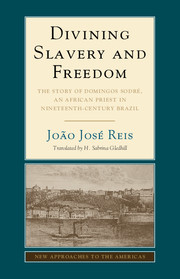 Divining Slavery and Freedom
Divining Slavery and Freedom Book contents
- Frontmatter
- Dedication
- Contents
- Preface
- Abbreviations
- Map
- 1 Cops and Candomblé in Domingos Sodré's Day
- 2 From an African in Onim to a Slave in Bahia
- 3 Domingos Sodré, Diviner
- 4 Witchcraft and Slavery
- 5 Witchcraft and Manumission
- 6 Meet Some Friends of Domingos Sodré
- 7 Domingos Sodré, Ladino Man of Means
- Epilogue
- Timeline of Domingos Sodré's Life
- Glossary
- Appendix 1 Domingos Sodré's Last Will and Testament (1882)
- Appendix 2 Domingos' Manumission and Manumissions Granted by Him
- Appendix 3 Delfina's Petition Guaranteeing Her Mental Health
- Illustration and Map Credits
- Bibliography
- Acknowledgments
- Name Index
- Subject Index
Epilogue
Published online by Cambridge University Press: 05 May 2015
- Frontmatter
- Dedication
- Contents
- Preface
- Abbreviations
- Map
- 1 Cops and Candomblé in Domingos Sodré's Day
- 2 From an African in Onim to a Slave in Bahia
- 3 Domingos Sodré, Diviner
- 4 Witchcraft and Slavery
- 5 Witchcraft and Manumission
- 6 Meet Some Friends of Domingos Sodré
- 7 Domingos Sodré, Ladino Man of Means
- Epilogue
- Timeline of Domingos Sodré's Life
- Glossary
- Appendix 1 Domingos Sodré's Last Will and Testament (1882)
- Appendix 2 Domingos' Manumission and Manumissions Granted by Him
- Appendix 3 Delfina's Petition Guaranteeing Her Mental Health
- Illustration and Map Credits
- Bibliography
- Acknowledgments
- Name Index
- Subject Index
Summary
As a narrative genre, biographical studies of individuals who experienced slavery – even more so those who overcame it – are attracting increasing interest. These studies have so far been particularly focused on the slaveholding complex in the North Atlantic. Biographies of Africans and their descendants enable us to perceive the broad movement of history from a new, more human perspective, including the slave trade, the rise and fall of slavery in the New World, the reshaping of the Old World by colonization and slave labor – in short, the formation of Atlantic societies, economies, and cultures. Telling these personal stories can also serve as a strategy for understanding the historic process that shaped modernity in the broadest sense, particularly societies anchored in the system of slavery that arose from that process.
There is keen interest in biographies of this kind in Brazil as well. I am not referring to the biographies of major figures, such as black abolitionists, but of people who lived in the shadows of anonymity, whose memory has either been lost or belongs more to the realm of myth and folklore than history. The subjects of these biographies have multiplied in Brazilian historiography in recent years, and their names should be spelled out, such as Rosa Egipcíaca, Dom Obá II d’África, Chica da Silva, Antônio Dutra, Tito de Camargo, Juca Rosa, Caetana, Liberata, Rufino José Maria, Domingos Álvares, and others. In some cases, their lives can be documented from birth to death, but in most, they can only be seen, sometimes glimpsed, in their “dramatic moments” before disappearing from the archives without a trace. Aside from the fact that there are more documents for some than for others, these personal histories are not only significant in their singularity but enable us better to perceive collective experiences and shed light on broader, more complex historical contexts and processes.
- Type
- Chapter
- Information
- Divining Slavery and FreedomThe Story of Domingos Sodré, an African Priest in Nineteenth-Century Brazil, pp. 295 - 300Publisher: Cambridge University PressPrint publication year: 2015
